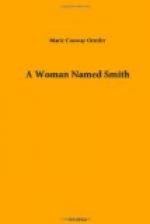Yours faithfully,
GEORGE PEABODY WESTMACOTE.
Letter from Miss Emmeline Phelps-Parsons, of Boston:
Dear Miss Smith:
My cousin Mrs. Westmacote, whom I have been visiting, showed me your letter and the enchanting photographs of your house which you were kind enough to send Mr. Westmacote. Hynds House is just the one place I have long been looking for!—an unspoiled colonial house, with historic associations!
It is perfect! I must see with my own eyes those Chelsea figures on your drawing-room mantel, the luster and Washington jugs in the dining-room, and the cabinets in the hall.
Sincerely
yours,
EMMELINE
PHELPS-PARSONS.
P.S. I hope it is really
true that there is an Influence in
Hynds House? I do so greatly long to come
in contact with
the Occult and the Unknown!
“Somewhere on the firing-line of fifty,” mused Alicia. “A lady with a soul. Don’t you hear dear old Boston calling you, Sophy? Here’s one to put Miss Martha Hopkins’s light under a bushel basket!”
We had several other inquirers; and chose from them Mr. Chetwynd Harrison-Gore and his daughter, English folk “doing” America and delighted to include a Carolina colonial house in their trip; a suffrage leader, whose throat needed a rest; and Morenas, the illustrator. It seemed that Hynds House offered to each one something that had been craved for.
The Author pounced upon us two or three days before we expected him, to take stock after his own fashion. I have heard The Author commended for “the humor of his rare smile and the keen, kind intellectuality of his remarkable eyes.” Well, the smile was rare enough; and of course there isn’t any doubt about the man’s intellectuality. For the rest, he proved to be a tall, lanky, stooping person, with a thin tanned face, outstanding ears, a high nose, and long, blue-gray eyes half-hidden under drooping lids and behind glasses. His hair was just hair. And he had the sort of mustache that bristled like a cat’s when he twisted his lip.
So far as monetary success, and efficacious press-agents, and the adulation, admiration, emulation, and envy of his contemporaries went, he had nothing to complain of. He was lionized, quoted, courted, flattered, reviewed, viewed through rose-colored spectacles; and disillusioned, discontented, cynical, selfish, and, of course, most horribly bored. He was gun-shy of women; he suspected them of wanting to marry him. He was wary of men; he suspected them of wanting to exploit him. He loathed children, who were generally obstreperous and unnecessary editions of parents he didn’t admire. He didn’t even trust the beautiful works of men’s hands. They, even they, were too often faked! If you had dug up the indubitable mummy of the first Pharaoh from under the oldest of the pyramids, The Author would have turned him over on his back and hunted for the trade-mark of The Modern Mummy-makers: London, Paris, and New York; Catalogue on Request.




